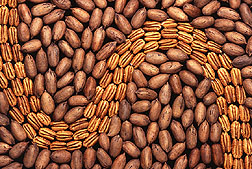This page has been archived and is being provided for reference purposes only. The page is no longer being updated, and therefore, links on the page may be invalid.
|
|
Nutritional Deficiencies Affect BehaviorBy Judy McBrideJanuary 29, 1997 A shortage of copper or magnesium in the diet may affect human behavior, according to scientists with USDA's Agricultural Research Service. The scientists say laboratory rats that didn't eat enough of these essential minerals were hyperactive and had either learning or memory deficiencies. Magnesium is found in a wide range of plant and animal foods, including nuts, whole grains, green leafy vegetables, meat, fish and poultry and dried fruit. The richest source of copper is oysters. Earlier experiments showed copper and magnesium have important roles in brain function. So the ARS researchers fed rats diets containing either adequate copper or about one-tenth the adequate level for 10 weeks. In a second study, they altered the magnesium content of the diets in the same manner. Deficiencies of both minerals prompted the rats to be generally more active. That's consistent with symptoms of magnesium deficiency in people who often experience tremors and disrupted sleep. The animals also turned in circles incessantly, similar to people who exhibit obsessive behaviors. Copper-deficient rats were slower to learn, and the magnesium-deficient animals had more difficulty remembering than their counterparts who got adequate doses of these minerals. Scientific contact: James G. Penland, Grand Forks Human Nutrition Research Center, Grand Forks, ND, (701) 795-8471; e-mail: jpenland@gfhnrc.ars.usda.gov |


